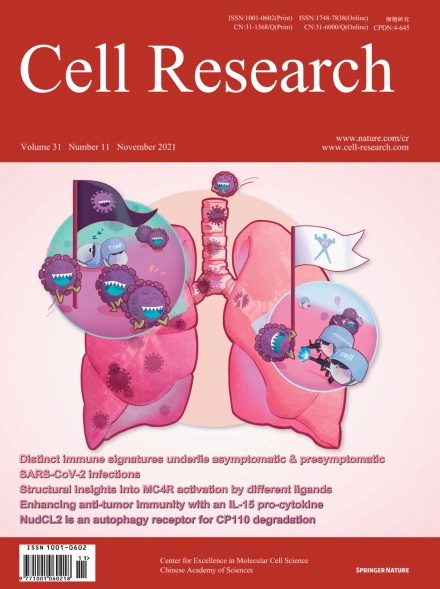
Advanced Search
Submit Manuscript
Advanced Search
Submit Manuscript
Volume 31, No 11, Nov 2021
ISSN: 1001-0602
EISSN: 1748-7838 2018
impact factor 17.848*
(Clarivate Analytics, 2019)
Volume 31 Issue 11, November 2021: 1199-1211 |
NudCL2 is an autophagy receptor that mediates selective autophagic degradation of CP110 at mother centrioles to promote ciliogenesis
Min Liu1 , Wen Zhang2,3,† , Min Li2 , Jiaxing Feng2 , Wenjun Kuang2 , Xiying Chen2 , Feng Yang2 , Qiang Sun2 , Zhangqi Xu2 , Jianfeng Hua2 , Chunxia Yang2 , Wei Liu2 , Qiang Shu1 , Yuehong Yang2 , Tianhua Zhou2,3,4,5,* , Shanshan Xie1,*
1The Children’s Hospital, Zhejiang University School of Medicine, National Clinical Research Center for Child Health, Hangzhou, Zhejiang, ChinaPrimary cilia extending from mother centrioles are essential for vertebrate development and homeostasis maintenance. Centriolar coiled-coil protein 110 (CP110) has been reported to suppress ciliogenesis initiation by capping the distal ends of mother centrioles. However, the mechanism underlying the specific degradation of mother centriole-capping CP110 to promote cilia initiation remains unknown. Here, we find that autophagy is crucial for CP110 degradation at mother centrioles after serum starvation in MEF cells. We further identify NudC-like protein 2 (NudCL2) as a novel selective autophagy receptor at mother centrioles, which contains an LC3-interacting region (LIR) motif mediating the association of CP110 and the autophagosome marker LC3. Knockout of NudCL2 induces defects in the removal of CP110 from mother centrioles and ciliogenesis, which are rescued by wild-type NudCL2 but not its LIR motif mutant. Knockdown of CP110 significantly attenuates ciliogenesis defects in NudCL2-deficient cells. In addition, NudCL2 morphants exhibit ciliation-related phenotypes in zebrafish, which are reversed by wild-type NudCL2, but not its LIR motif mutant. Importantly, CP110 depletion significantly reverses these ciliary phenotypes in NudCL2 morphants. Taken together, our data suggest that NudCL2 functions as an autophagy receptor mediating the selective degradation of mother centriole-capping CP110 to promote ciliogenesis, which is indispensable for embryo development in vertebrates.
https://doi.org/10.1038/s41422-021-00560-3